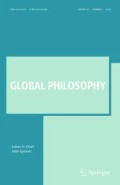Abstract
The literature on mathematical explanation contains numerous examples of explanatory, and not so explanatory proofs. In this paper we report results of an empirical study aimed at investigating mathematicians’ notion of explanatoriness, and its relationship to accounts of mathematical explanation. Using a Comparative Judgement approach, we asked 38 mathematicians to assess the explanatory value of several proofs of the same proposition. We found an extremely high level of agreement among mathematicians, and some inconsistencies between their assessments and claims in the literature regarding the explanatoriness of certain types of proofs.



Similar content being viewed by others
Notes
Delarivière et al. (2017) clarified that ontic accounts do not necessarily deny a possible relationship between explanation and understanding; ontic accounts simply do not use understanding as a defining criterion of the explanatory value of a proof (p. 312).
Data and code are available at https://doi.org/10.17028/rd.lboro.12458486
References
Andersen LE (2020) Acceptable gaps in mathematical proofs. Synthese 197:233–247
Avigad J (2006) Mathematical method and proof. Synthese 153:105–159
Avigad J (2008) Understanding proof P. In: Mancosu (ed) The Philosophy of Mathematical Practice. Oxford University Press, New York, pp 317–353
Bisson M-J, Gilmore C, Inglis M, Jones I (2016) Measuring conceptual understanding using comparative judgement. Int J Res Undergrad Math Educ 2:141–164
Bradley R, Terry M (1952) Rank analysis of incomplete block designs the method of paired comparisons. Biometrika 39:324–345
Brown JR (1999) Philosophy of mathematics: An introduction to a world of proofs and pictures. Routledge, London
Colyvan M (2012) An Introduction to the Philosophy of Mathematics. Cambridge University Press, Cambridge
D’Alessandro W (2020) Mathematical explanation beyond explanatory proof. British J Philos Sci 71:581–603. https://doi.org/10.1093/bjps/axy009
Delarivière S, Frans J, Van Kerkhove B (2017) Mathematical explanation: A contextual approach. J Indian Counc Philos Res 34:309–329
Fallis D (2003) Intentional gaps in mathematical proofs. Synthese 134:45–69
Hafner J, Mancosu P (2005) The varieties of mathematical explanation. In: Mancosu P et al (eds) Visualization, Explanation and Reasoning Styles in Mathematics. Springer, Berlin, pp 215–250
Hanna G (2000) Proof, explanation and exploration: An overview. Educ Stud Math 44(1–2):5–23. https://doi.org/10.1007/s10516-021-09545-8
Hanna G. (2018) Reflections on proof as explanation. In Stylianides A, Harel G (Eds.) Advances in mathematics education research on proof and proving (pp. 3–18). ICME-13 Monographs. Cham, Switzerland: Springer.
Heldsinger S, Humphry S (2013) Using calibrated exemplars in the teacher-assessment of writing: an empirical study. Edu Res 55(3):219–235
Hunter DR (2004) MM algorithms for generalized Bradley-Terry models. Ann Stat 32:384–406
Inglis M, Aberdein A (2015) Beauty is not simplicity: an analysis of mathematicians’ proof appraisals. Philos Mathematica 23:87–109
Inglis M, Aberdein A (2016) Diversity in proof appraisal. In: Larvor B (ed) Mathematical cultures. Birkhäuser, Switzerland, pp 163–179
Inglis M, Aberdein A (2020) Are aesthetic judgements purely aesthetic? Testing the social conformity account. ZDM 52(6):1127–1136. https://doi.org/10.1007/s11858-020-01156-8
Inglis M, Mejía-Ramos JP, Weber K, Alcock L (2013) On mathematicians’ different standards when evaluating elementary proofs. Topics Cogn Sci 5(2):270–282. https://doi.org/10.1111/tops.12019
Inglis M, Mejía-Ramos JP (2019) Functional explanation in mathematics. Synthese. https://doi.org/10.1007/s11229-019-02234-5
Jones I, Bisson M, Gilmore C, Inglis M (2019) Measuring conceptual understanding in randomised controlled trials: can comparative judgement help? Br Edu Res J 45:662–680
Jones I, Inglis M (2015) The problem of assessing problem solving: can comparative judgement help? Educ Stud Math 89:337–355
Jones I, Wheadon C, Humphries S, Inglis M (2016) Fifty years of A-level mathematics: have standards changed? Br Edu Res J 42:543–560
Kalyuga S (2007) Expertise reversal effect and its implications for learner-tailored instruction. Educ Psychol Rev 19:509–539
Kitcher P (1981) Explanatory unification. Philos Sci 48:507–531
Lange M (2009) Why proofs by mathematical induction are generally not explanatory. Analysis 69:203–211
Lange M (2014) Aspects of mathematical explanation: Symmetry, unity, and salience. Philos Rev 123:485–531
Lange M (2016) Explanatory proofs and beautiful proofs. J Humanistic Math 6(1):8–51. https://doi.org/10.5642/jhummath.201601.04
Löwe B, Van Kerkhove B (2019) Methodological triangulation in empirical philosophy (of Mathematics). In: Aberdein A, Inglis M (eds) Advances in Experimental Philosophy of Logic and Mathematics. Bloomsbury, London, pp 15–38
Lyon A, Colyvan M (2008) The explanatory power of phase spaces. Philosophia Mathematica 16(2):227–243
Mancosu, P. (2018). Explanation in Mathematics. In: Zalta EN (Ed.) The Stanford Encyclopedia of Philosophy (Summer 2018 Edition). https://plato.stanford.edu/archives/sum2018/entries/mathematics-explanation/.
McMahon S, Jones I (2015) A comparative judgement approach to teacher assessment. Assess Educ: Princ Polic Pract 22(3):368–389. https://doi.org/10.1080/0969594X.2014.978839
Mejía Ramos JP, Alcock L, Lew K, Rago P, Sangwin C, Inglis M (2019) Using corpus linguistics to investigate mathematical explanation. In: Eugen F, Mark C (eds) Methodological Advances in Experimental Philosophy. Bloomsbury, London, pp 239–263
Ording P (2019) 99 Variations on a Proof. Princeton University Press, Princeton
Pollitt A (2012) The method of adaptive comparative judgement. Assess Educ: Princ Polic Pract 19:281–300
Resnik MD, Kushner D (1987) Explanation, independence and realism in mathematics. Br J Philos Sci 38(2):141–158
Salmon WC (1984) Scientific explanation and the causal structure of the world. Princeton University Press, Princeton, NJ
Steiner M (1978) Mathematical explanation. Philos Stud 34:135–151
Thurstone LL (1927) A law of comparative judgement. Psychol Rev 34:273–286
Thurstone LL (1954) The measurement of values. Psychol Rev 61:47–58
Weber E, Frans J (2017) Is mathematics a domain for philosophers of explanation? J Gen Philos Sci 48(1):125–142
Zelcer M (2013) Against mathematical explanation. J Gen Philos Sci 44:173–192
Acknowledgements
This work was iniated during Matthew Inglis’s visit to Auckland in 2019, which was funded by the University of Auckland’s Department of Mathematics. Colin Rittberg and Matthew Inglis are part-funded by Research England. We are grateful for this financial support. We thank Joachim Frans and two anonymous reviewers for helpful remarks.
Author information
Authors and Affiliations
Corresponding author
Additional information
Publisher's Note
Springer Nature remains neutral with regard to jurisdictional claims in published maps and institutional affiliations.
Appendix
Appendix
One-line

Two-column

Elementary

Visual

Contradiction

Substitution

Taylor series

Experimental

Rights and permissions
About this article
Cite this article
Mejía Ramos, J.P., Evans, T., Rittberg, C. et al. Mathematicians’ Assessments of the Explanatory Value of Proofs. Axiomathes 31, 575–599 (2021). https://doi.org/10.1007/s10516-021-09545-8
Received:
Accepted:
Published:
Issue Date:
DOI: https://doi.org/10.1007/s10516-021-09545-8



